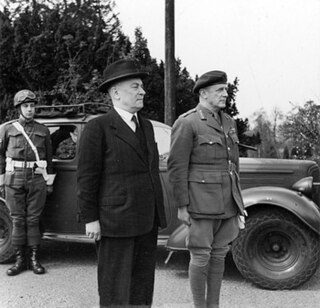
Henri (Hendrik) de Man was a Belgian politician and leader of the Belgian Labour Party (POB-BWP). He was one of the leading socialist theoreticians of his period and, during the German occupation of Belgium during World War II, was heavily involved in collaboration.
Neosocialism was a political faction that existed in France and Belgium during the 1930s and which included several revisionist tendencies in the French Section of the Workers' International (SFIO).

Alfred Rosmer was an American-born French Communist political activist and historian who was a leading member of the Comintern. Rosmer is best remembered as a political associate of Leon Trotsky and a memoirist.

Emile Vandervelde was a Belgian socialist politician. Nicknamed "the boss", Vandervelde was a leading figure in the Belgian Labour Party (POB–BWP) and in international socialism.

Achille Van Acker was a Belgian politician who served three terms as the prime minister of Belgium between 1946 and 1958. A moderate from Flanders, Van Acker was a member of the Belgian Socialist Party (PSB–BSP) and played an important role in the creation of the Belgian welfare state after World War II.

The Belgian Labour Party was the first major socialist party in Belgium. Founded in 1885, the party was officially disbanded in 1940 and superseded by the Belgian Socialist Party in 1945.

The Charter of Quaregnon is a political manifesto agreed to in 1894 that formed the doctrinal basis for successive socialist parties in Belgium until 1979.

The Belgian Government in London, also known as the Pierlot IV Government, was the government in exile of Belgium between October 1940 and September 1944 during World War II. The government was tripartite, involving ministers from the Catholic, Liberal and Labour Parties. After the invasion of Belgium by Nazi Germany in May 1940, the Belgian government, under Prime Minister Hubert Pierlot, fled first to Bordeaux in France and then to London, where it established itself as the only legitimate representation of Belgium to the Allies.
The minister of justice of Belgium is responsible for the Federal Public Service Justice.

The general strike of 1960–1961, known popularly in Wallonia as the Strike of the Century, was a major series of strikes in Belgium which began on 14 December 1960 and lasted approximately six weeks.

The general strike of 1893 was a major general strike in Belgium in April 1893 called by the Belgian Labour Party (POB–BWP) to pressure the government of Auguste Beernaert to introduce universal male suffrage in elections. The general strike was the first called in Belgium and a decisive moment for the nascent socialist movement in Belgium. According to the historian Carl J. Strikwerda, it was the first true general strike in the history of Europe.

Since 1893, there have been a number of general strikes in Belgium. Occasioned by the emergence of the labour movement and socialism in Belgium, general strikes have been an enduring part of Belgian political life. Originally intended to encourage the reform of the franchise, more recent strikes have focused on issues of wages and opposition to government austerity. Since 1945, general strikes have been co-ordinated by the General Federation of Belgian Labour (ABVV-FGTB), a federation of Socialist trade unions, while most before World War II were organised by the parliamentary Belgian Labour Party (POB-BWP).
Marc A. Van Audenrode is a Canadian econmoist who is managing principal at Analysis Group, the largest privately held economic consulting firm in the United States, and an adjunct professor at Université de Sherbrooke.
Henri Lambert (1862–1934) was a Belgian engineer and glass works owner at Charleroi near Brussels. His glass works was the largest in the world in that time. He was one of the first occupied with social economy. He spoke Walloon with his blue collar workers, which was exceptional in that time. He was a prolific writer of articles for newspaper and political journals, brochures, and books on political philosophy, and had several of his works translated into German and English. He favoured individualism, free trade, and international peace. He also wrote works about corporations, trade unions, government, democracy, and representation, voicing bold and well-intentioned ideas. But his criticism of the principle of limited liability in connection with corporations is an original point which seems to have attracted attention at the turn of the century, as well as his ideas about the organisation of trade unions. He was called upon to address lawyers' and economists' associations and other bodies.

The general strike of 1902 was a major general strike in Belgium, aimed at forcing electoral reform and notably the end of the system of plural voting. It officially lasted between 10 and 20 April. The 1902 strike was the second general strike in Belgium's history and although the largest, it was ultimately unsuccessful at achieving its objectives.
The general strike of 1913 was a major general strike in Belgium. It was the third general strike aimed at forcing electoral reform and, like the general strike of 1902, was particularly aimed at ending the system of plural voting. It officially lasted between 14 and 24 April and brought out between 300,000 and 450,000 workers on strike. Despite its large participation, it was relatively peaceful.

Edgard Milhaud was a French professor of economics, a militant socialist, and a promoter and theoretician of social economy.
Louise van den Plas was a Belgian suffragist and the founder of the first Christian feminist movement in Belgium.
The following lists events that happened during 1905 in the Kingdom of Belgium.

The Conseil National des Femmes Belges, or National Council of Belgian Women, is the name of a Belgian women's organization which was founded in 1905 as the Belgian chapter of the International Council of Women (ICW). Over the years, the organization succeeded in supporting the emancipation of women in a wide range of interests until its mandate was limited to French-speaking Belgian women in 1974. In 1990, the name was changed to Conseil des Femmes Francophones de Belgique.











